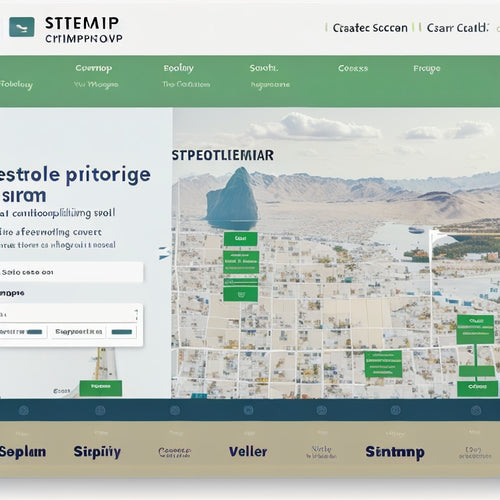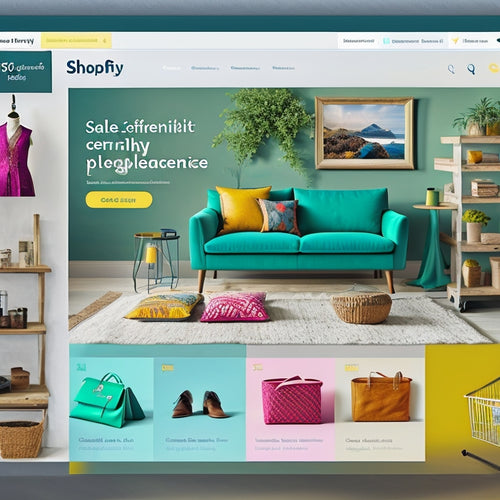
Revolutionizing E-Commerce Development With Django
Share
You're building e-commerce platforms that can handle massive traffic and provide a seamless user experience, and Django is the perfect catalyst to make that happen. Django's scalability, security, and flexibility make it ideal for building feature-rich e-commerce platforms. With Django, you can integrate Wagtail CMS and Snipcart to streamline product management, creating a secure shopping experience. By combining these tools, you'll be able to create, update, and delete products effortlessly. As you explore Django's e-commerce ecosystem, you'll discover how to build scalable solutions that prioritize user authentication and content management, and you'll uncover more opportunities to take your e-commerce development to the next level.
Key Takeaways
• Django's scalability, security, and feature-rich functionalities make it an ideal choice for building e-commerce platforms that handle high traffic volumes.
• Integrating Wagtail CMS with Snipcart enables seamless product management and a secure shopping experience through API integration and content management features.
• Django's versatility and Python's readability enable efficient code writing, making it possible to build scalable and secure e-commerce solutions quickly.
• Load balancing, caching, and database enhancement are essential considerations for building scalable e-commerce solutions with Django.
• Django's flexibility and adaptability enable customization and integration with various tools and services, making it a revolutionary choice for e-commerce development.
Python and Django Overview
As you explore the world of e-commerce development, understanding that Python, a popular and dynamic programming language created by Guido van Rossum in the late 80s, serves as the basis for Django, a high-level Python web framework celebrated for its speed, security, scalability, and flexibility is essential.
Python's readability makes it an ideal choice for developers, allowing them to focus on writing efficient code. Django, built on top of Python, inherits its versatility, making it a go-to framework for web applications.
With Django, you can leverage its robust features, such as reusable components, to build scalable and secure e-commerce platforms. By combining Python's readability with Django's versatility, you'll be well-equipped to tackle complex e-commerce projects with confidence.
Django for E-Commerce
You'll find that Django's strengths in scalability, security, and feature-rich functionalities make it an ideal framework for building e-commerce startups that can handle high traffic volumes and prioritize user authentication and content management. Django's advantages in e-commerce development include:
| Feature | Description | Benefit |
|---|---|---|
| Scalability | Handles high traffic volumes | Guarantees seamless user experience |
| Security | Prioritizes user authentication and content management | Safeguards sensitive user data |
| Flexibility | Offers feature-rich functionalities | Allows for customization and adaptability |
Wagtail CMS and Snipcart Integration
Integrate Wagtail CMS with Snipcart to access a powerful Django-powered e-commerce platform, allowing you to harness the strengths of both tools to create a seamless online shopping experience.
As a developer, you'll appreciate Wagtail's flexibility in managing products, which is essential for a successful e-commerce setup. By combining Wagtail with Snipcart, you can leverage API integration to streamline your product management process.
This integration enables you to create, update, and delete products effortlessly, ensuring your online store stays up-to-date and accurate. With Wagtail's robust content management features and Snipcart's e-commerce capabilities, you'll be able to provide a secure and reliable shopping experience for your customers.
Development Process and Tools
To get started with building your Django-powered e-commerce platform, you'll need to set up your project with the required configuration settings and tools, including Snipcart and Wagtail CMS. This involves adding Snipcart configuration settings, generating database migrations, and creating products.
Next, you'll set up the Tailwind CSS framework to handle HTML design and implement purgeCSS for optimized CSS output. For a seamless development process, consider using django-livereload-server to reload your project automatically.
You can find additional resources and code samples on the GitHub repo. By following these steps, you'll be well on your way to building a scalable and secure e-commerce platform with Django.
Building Scalable E-Commerce Solutions
Building scalable e-commerce solutions with Django requires careful consideration of several key factors, including load balancing, caching, and database enhancement, all of which can greatly impact your platform's performance and ability to handle high traffic volumes. As you design your solution, you'll need to address scalability challenges, such as handling sudden spikes in traffic or increased demand during peak sales periods.
| Scalability Strategy | Description |
|---|---|
| Load Balancing | Distribute incoming traffic across multiple servers to reduce server load and enhance response times. |
| Caching | Store frequently accessed data in memory to reduce database queries and enhance performance. |
| Database Enhancement | Optimize database schema and queries to reduce latency and improve data retrieval. |
| Content Delivery Networks (CDNs) | Distribute static assets across multiple servers to reduce latency and improve performance. |
| Auto Scaling | Automatically add or remove servers based on traffic demand to ensure peak performance. |
Leveraging Django's E-Commerce Ecosystem
You can tap into Django's extensive e-commerce ecosystem, which offers a range of pre-built solutions and tools to accelerate your project's development. By leveraging these solutions, you can capitalize on Django features that provide e-commerce advantages, such as scalability, security, and SEO-friendliness.
Prominent e-commerce solutions in the Python/Django ecosystem include Oscar, Saleor, Django-SHOP, and Shuup, each offering unique features and tools to build and customize e-commerce setups. These solutions provide a solid foundation for your project, allowing you to focus on customizing and extending them to meet your specific needs.
Author's Experience and Final Thoughts
With a solid foundation in Django's e-commerce ecosystem established, let's hear from the author, Guillaume Genest-Lebel, who shares his experience and final thoughts on leveraging Wagtail and Snipcart for e-commerce development.
| Author's Perspective | Industry Insights |
|---|---|
| Guillaume's experience with TypeScript and ASP.NET influenced his approach to Django e-commerce development | Django's scalability and security make it an ideal choice for e-commerce startups |
| He highlights Wagtail's user-friendliness and potential as a headless CMS with API capabilities | Industry trends indicate a growing demand for customized e-commerce solutions |
| Guillaume's exploration of new programming trends and home automation projects inspired his approach to Django development | Django's ecosystem offers various tools and packages to build and customize e-commerce setups |
| He notes the importance of detailed documentation for Wagtail and Snipcart integration | The combination of Wagtail and Snipcart enables developers to build a Django-powered e-commerce platform |
| Guillaume's experience with Django has opened up new possibilities for integration with front-end tools like Next.js or Gatsby | Django's ecosystem provides a solid foundation for e-commerce development, offering reliability and continuous updates |
Frequently Asked Questions
Can Django Be Used for Building Mobile Applications?
You can leverage Django for mobile app development, utilizing its robust backend capabilities to create a RESTful API that seamlessly interacts with your mobile app, ensuring cross-platform compatibility and a secure, scalable foundation.
How Does Django Compare to Other Python Web Frameworks?
When evaluating Python web frameworks, you'll find Django excels in performance benchmarks, outpacing Flask in complex projects, while Flask shines in smaller, rapid-development scenarios, making Django the ideal choice for large-scale, secure, and scalable applications.
What Are the System Requirements for Running Django Projects?
You'll need a computer with sufficient hardware, such as a multi-core processor, 8GB RAM, and SSD storage, along with software like Python 3.8+, pip, and a code editor or IDE, to run Django projects efficiently and securely.
Is Django Suitable for Building Real-Time Collaboration Tools?
You'll find Django suitable for building real-time collaboration tools, as it handles high traffic volumes and prioritizes security, but be aware of its limitations with real-time updates, and consider leveraging collaborative features like websockets to optimize scalability.
Can Django Be Used With Other Programming Languages Besides Python?
Can you imagine building a project with the flexibility to incorporate multiple languages? Yes, you can! Django's cross-platform compatibility allows seamless integration with JavaScript frameworks, enabling you to leverage the strengths of each language in your project.
Related Posts
-

How Do I Create a Sitemap on Shopify
This article provides an informative overview of the process of creating a sitemap on the Shopify platform. The disc...
-

How Do I Optimize My Shopify Store
This article presents practical knowledge on optimizing a Shopify store for better performance. It discusses the ben...
-

Which Sales Channel Is Best for Shopify
This article aims to provide an objective analysis of the various sales channels available for Shopify. It explores ...


